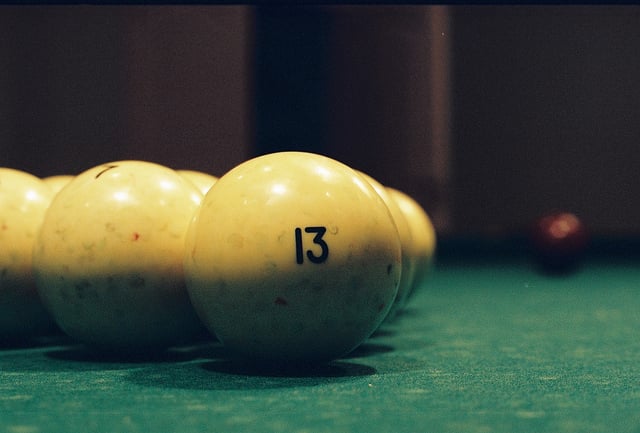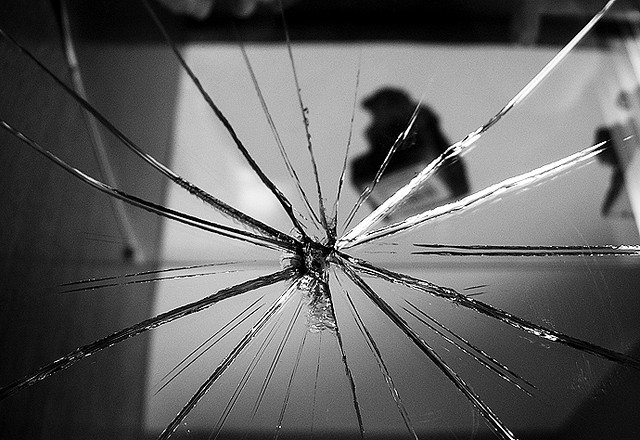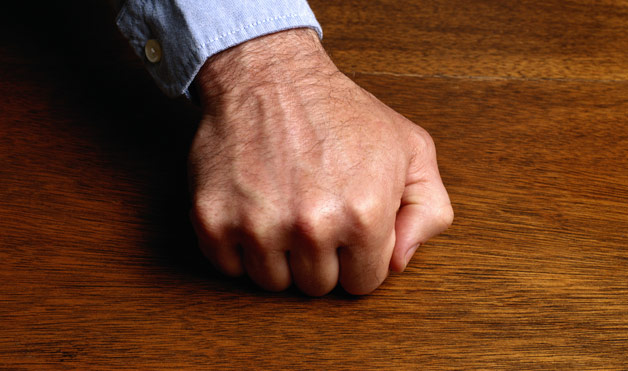Do you knock on wood to ward off unlucky outcomes? Do you avoid walking under ladders and shudder at the thought of shattering a mirror? If so, you may be superstitious.
Superstitions, or beliefs in supernatural causalities, may contradict natural science, but they're prevalent in astrology, omens, witchcraft, and prophecies, as well as many religious beliefs and traditions. Superstitions pass on from generation to generation through word of mouth. They are found across a variety of cultures all over the world.
Superstitions often deal with our primal fears of something bad happening to us. Instead of accepting that most superstitions have no real bearing, it's easier for some people to imagine that the world is a place that, with a little luck, one can try and control.
Do you believe in any of these superstitions? Tell us below in the comments, and please SHARE with everyone to have good luck for the rest of the year!
H/T: PsychicLibrary
SUPERSTITION: A Black Cat Crossing Your Path Means Bad Luck

ORIGINS: Though some cultures, like the ancient Egyptians, held black cats in high regard, during the Middle Ages public opinion on black cats took a turn for the worse. In 1233, Pope Gregory IX decreed that black cats were diabolical. They were perceived as conspirators of witches or evil demons. Due to this new paranoia, black cats were killed in great numbers and their owners faced harsh punishments. Today's superstition stems from the almost 800-year-old belief that if a black cat crossed your path, it would block your connection to God — and thus your entrance to heaven.
SUPERSTITION: The Number 13 Is Unlucky

ORIGINS: It's all biblical — at least according to scholars. Judas, the apostle who betrayed Jesus, was the 13th person to be seated at the Last Supper. In addition, many Christians have traditionally been wary of Friday because it was the day that Jesus was crucified. Some theologians believe that Adam and Eve ate the forbidden fruit on a Friday, and that the Great Flood began on a Friday. In contrast, ancient Egyptians saw 13 as a lucky number, as they believed in the 12 stages of life, and the 13th step represented enlightenment. The fear of the number 13 persists today. Many hotels, office buildings, and apartments will "omit" the 13th floor by referring to it as the 14th. There's even a term for the fear of the number: triskaidekaphobia.
SUPERSTITION: A Broken Mirror Means Seven Years Of Bad Luck

ORIGINS: Before mirrors, people were only able to see their reflections in water. Reflections represented the soul; thus, distorting the image was seen as a damage to not only the image, but to the soul as well. The ancient Greeks, Hebrews, and Romans created unbreakable mirrors out of materials like silver, gold, brass, and bronze — all of which were not only considered to be mystical, but extremely valuable possessions as well. Glass mirrors in 15th-century Venice were difficult to replace as they were very expensive. If a servant broke their master's mirror, the typical punishment was to serve seven years as the master's indentured servant. By the time France and England had created inexpensive mirrors in the 1600s, the superstition was firmly in place.
SUPERSTITION: The Number 7 Is Lucky

ORIGINS: Our love of the number seven has both ancient and religious origins. Before telescopes were invented, we could see only seven planets in the sky. This may explain why so many ancient cultures have seven gods or deities. For example: the ancient Arabs built seven holy temples, the Bible indicates God created the world in six days and rested on the seventh, there are seven sacraments, seven seals in Revelations, seven deadly sins, seven stars, seven heavenly virtues, and seven last plagues. In the Hebrew Torah, every seventh year is considered to be a holy year.
Coincidentally, we have identified only seven wonders of the world. Nevertheless, every culture doesn't exactly agree that the number seven is lucky so much as it is significant — in Chinese culture, for example, seven symbolizes death.
SUPERSTITION: Knocking On Wood Wards Off Unlucky Outcomes

ORIGINS: Some believe that knocking on wood can ward off bad outcomes or evil spirits and that it may even tempt fate and bring good fortune. The ancient Greeks worshipped the Oak tree, so touching it was thought to bring good luck. In Irish folklore, touching wood is a means of sending a thank you to the leprechauns, and you can't get much luckier than them.
Some scholars believe that the superstition can be traced back to the Spanish Inquisition of the 15th century, when Jews fled to hide in synagogues built out of wood and came up with a special knocking code to get in. Other scholars think the practice has something to do with Jesus and the wooden cross, as touching a crucifix may grant a little luck. In the 19th century, many children's games involved riddles and rhymes about knocking on wood for good fortune.
But wait — that's not all! Find out the reason behind five more common superstitions on the next page!
SUPERSTITION: Walking Beneath A Ladder Brings Bad Luck

ORIGINS: This superstition may stem from the medieval fear of the gallows. As punishment, people were publicly hanged on the top rungs of ladders. If someone walked underneath a gallows ladder, it was thought that they had brought a future hanging upon themselves. Alternatively, if one walked beneath a hanging dead body, there was the danger that the corpse would fall onto the person and cause harm or death. Christians connected more modern ladders to the one that rested against Jesus during his crucifixion. Thus, the ladder became a symbol of wickedness and even death. Centuries before, ancient Egyptians believed that the shape of a triangle was sacred (hence the pyramids), as it represented the trinity of the gods. Walking beneath such a trinity was seen as a desecration of their image.
SUPERSTITION: Stepping On A Crack Is Bad Luck

ORIGINS: You've likely heard the saying, "Step on a crack and break your mother's back!" — but where did this strange phrase come from? In 19th- and early 20th-century America, the phrase took very a racist twist: "Step on a crack and your mother's baby will be black," or "Step on a crack and your mother will be black." Interracial marriages were illegal at the time and stepping on a crack may have represented crossing a racial divide. Yeah, terrible. I know. Moreover, cracks in the ground were also associated with hell and the underworld, so stepping on them was thought to release demons upon the Earth.
SUPERSTITION: Saying "God Bless You" To A Sneeze

ORIGINS: For a time it was believed that breath was associated with the soul. A sneeze could then release the soul out of the body! The practice of saying "bless you" following a sneeze is common all over the world. However, the phrase "God bless you" is thought to date back to 1665, during the Black Plague. In sixth century Italy, Pope Gregory the Great even made a law stating that everyone who sneezed must be blessed, as a sneeze meant that their death was soon to follow. At the time, the bubonic plague had taken over the country, and severe sneezing was one of the first symptoms. The ancient Greeks and Romans believed that sneezing meant a forewarning of good and evil in their lives, and if a person sneezed, they would often be congratulated for freeing the evil spirits from their bodies.
SUPERSTITION: When You Spill Salt, Toss Some Over Your Left Shoulder To Avoid Bad Luck

ORIGINS: Though common everywhere today, salt was once a prized commodity and import all over the world. Phrases like "worth his salt" and "with a grain of salt" are peppered throughout our vernacular, and we even have a very "salty" superstition surrounding the substance. Around 3500 B.C., the ancient Sumerians began throwing a pinch of salt over their left shoulders after spilling some to ward off bad luck. The ritual spread to other cultures, including the ancient Egyptians, Greeks, and Assyrians. As for why the left side of our bodies is important, look to Christianity. Many Christians believe good spirits exist on the right-hand side and bad ones on the left, as the Devil is thought to sit at the left hand of God. Therefore, throwing salt over the left shoulder helps keep evil spirits away. Moreover, if you look closely at Leonardo DaVinci's depiction of the "Last Supper," Judas has spilled salt — a coy reference to his betrayal and lies.
SUPERSTITION: Opening An Umbrella Indoors Means Bad Luck

ORIGINS: Many scholars believe that this superstition originated in Victorian England, when stiff, clumsy umbrellas with metal spokes were quite hazardous to open and could seriously injure someone indoors. One good way to start an argument was to accidentally poke or prod someone with a sharp metal umbrella. Other scholars suggest that the superstition has its roots in ancient Egypt, when sunshades were thought to protect important nobles and religious leaders from potential evil spirits. It was thought that opening one inside would offend the Sun God.
Please SHARE with everyone you know!




